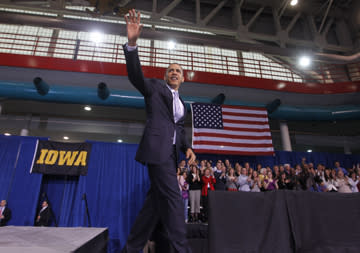 The Ticket
The TicketObama’s health care law was born in Iowa. Will it die there?

The road to health care reform—what the Republican presidential candidates routinely call "Obamacare," and likely the central issue of the fall 2012 campaign—began in Iowa.
In May 2007, Barack Obama was a United States senator and Democratic presidential candidate who was losing to Hillary Clinton by double digits in national polls, when he unveiled the first blueprint of what became the most comprehensive overhaul of the nation's health insurance laws in history.
Speaking to a mostly friendly audience at the University of Iowa in Iowa City, Obama spoke of the plight of average Americans who tried to keep up with the rising costs of medical care.
And when Obama signed his health care bill into law in March 2010, he celebrated by returning to Iowa City, where he touted the state's influence in helping to pass the legislation. "Because of you," Obama told the cheering crowd, "this is the place where change began."
Nearly two years later, Iowans' reaction to that change is mixed, as the state isn't the friendly territory it used to be for Obama—especially on health care.
Darlyne Neff, a 77-year-old breast cancer survivor whose efforts to pass the law landed her a White House invitation and a mention in Obama's 2010 speech in Iowa City, told Yahoo News that she still supports the law's overall goals. But she thinks the bill is "too expensive" and needs to be tweaked.
"We've got to do more to cut costs," Neff said. "We're trying to cover everything now, and everything into the future, and we simply aren't going to be able to afford that ... Everybody needs to be covered, but there has to be limits ... We can't pay for everything."
Neff, a former teacher who lives with her husband in a retirement village in Iowa City, organized roundtables with her neighbors in 2009 to talk about the legislation as Congress debated the measure. Two years later, she says many people she talks to still remain confused about how the law affects them—a sentiment also expressed by Jan Weissmiller, the owner of Prairie Lights Bookstore in Iowa City.
Obama mentioned the store in his March 2010 visit there, saying the law would help its owners to continue to offer health coverage to their employees. According to Weissmiller, the cost of covering her workers jumped more than 35 percent in 2009, before the law was signed, but has been "pretty stable" since—something she credits to Obama's health care law. Still, she remains cautious about further price increases and the law's long-term effects.
"We don't know what will happen," Weissmiller told Yahoo News. "My feeling is there's a lot of confusion among the general population about what the health care law means, and I would say, I'm somewhat confused, too, even though I do support most of what it's trying to do."
Four years ago, Obama's campaign proposal for nearly universal health care—at that time, without a mandate that individuals purchase insurance—helped him not only win Iowa's Democratic presidential caucuses in January 2008, but also carry the state in the fall, as Iowa voters went for Obama over John McCain by 10 points.
A key factor, according to exit polls conducted by the Des Moines Register, was Iowans' desire for "better health care." Nearly 60 percent of the state's voters backed Obama's push for universal health care, according to a Register poll—a number that stayed relatively consistent through 2009.
By 2011, 60 percent of voters in the state disapproved of Obama's handling of health care, according to a Des Moines Register poll of Iowa voters released in February—the most recent polling available in the state on the subject. Republican disapproval was at nearly 90 percent. Strikingly, 25 percent of Democrats and 61 percent of independent voters in the state also gave Obama a thumbs-down the issue.
Confusion over what the bill actually does may be the greatest danger to Obama's efforts to carry the state in 2012, even as many of the provisions of the bill have yet to kick in. Iowa is one of several states suing to overturn the law's requirement that individuals must obtain health coverage, and calls for the law to be repealed are regular applause lines on the Republican campaign trail.
"Very little is said in support of the plan or what it does for people, something compounded by the fact that many of the provisions that will most directly benefit the most people do not phase in until after the 2012 election," Arthur Sanders, a political science professor at Drake University in Des Moines, told Yahoo News.
"But once the Republicans have a specific candidate, it will be much easier for Obama to defend his health care plan since the Republican candidate will have to get beyond, 'This is a terrible plan, we need to get rid of it,' and suggest what they actually would do to replace it."
Obama anticipated that debate during his visit to Iowa City in 2010.
"Now that we passed it, they are already promising to repeal it," Obama said at the time. "And my attitude is: Go for it ... If they want to have that fight, we can have it."
This story is part of a series of articles on the politics of Iowa, leading up to Saturday's Republican presidential debate in Des Moines, sponsored by Yahoo! and ABC News.
Other popular Yahoo! News stories:
Want more of our best political stories? Visit The Ticket or connect with us on Facebook and follow us on Twitter.
